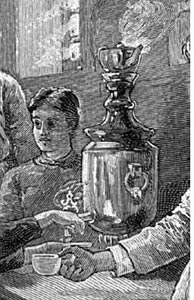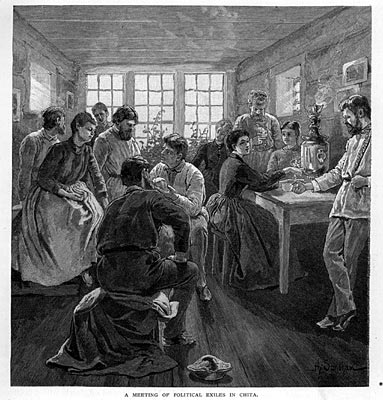Deep in the interior of Russia is a portion of the country known as
Siberia. Straddling the border with Mongolia, is an area that was (and
may still be) known as the Trans-Baikal.
It has been described as a "rather dreary and desolate region of sandy
pine barrens or wide stretches of short dead grass, broken here and
there by low hills covered with birches, larches, and evergreens." And
that was when the region was not buried in snow.
Although there were some in the region who had amassed great wealth
by trading, it was also known as the center of the Russian "exile system."
Toward the end of 1825 groups of noblemen tried to overthrow the Russian
autocracy and establish a constitutional form of government. The attempted
overthrow was to take place when Emperor Nicholas was to take the throne
in December of 1825.
The failed.
Since the victor gets the spoils, the vanquished got banished. Yep,
banished. For the next three years the men were rounded up and shipped
off to Siberia.

By the end of the 1800's the area was still full of prisoners and political
exiles.
So what's the point?
The point where we meet I guess, is over a cup of tea.
You see, one of the writers that writes on the site the Open Diary,
is from an area of Russia that is/was known as "White Russia." Her
name is Matreshka, and wrote (no longer on the web) in her diary called
Magic Kaleidoscope.
Turns out, we are both from Russia, although she is of a much more recent
vintage. I however, still carry the Russian name.
Recently she invited some folks over for tea, and described the rather
elaborate ceremony that one goes through when inviting guests over
for tea. She also talked about the Samovar, which is the "essence,
tool and decoration of the tea party."
And there it is, an enlargement of a wood cut from a magazine published
in May of 1889. As I was looking through the publication the other day,
I ran across the image and said to myself, "Hey, I know what that is."
The author describes the larger image; "The colony of exiles in Chita
at the time of our visit comprised some of the most interesting men
and women whom we met in the Trans-Baikal. We were received by them
with warm-hearted hospitality and perfect trust and spent with them
many long winter evenings in the upper room of the old Decembrist house,
talking of the Russian revolutionary movement . . . Such meetings as
that pictured (below) were of almost daily or nightly occurrence, and
are among the pleasantest recollections of our East Siberian life."
Thanks for the invite Matreshka. You have been most hospitable. Meet
some friends from the past.



